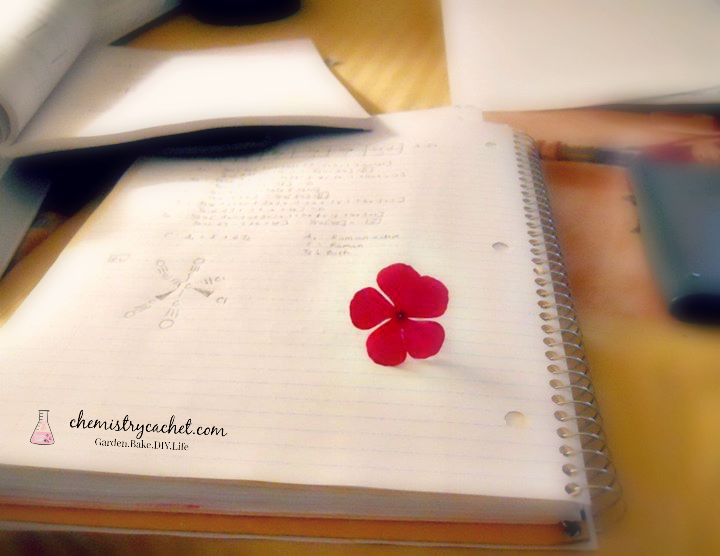Hey Chase the Write Dream readers! I’m Alexis, owner of Chemistry Cachet, a creative lifestyle blog. I am also an academic consultant, chemist, writer, editor and researcher.
 I am currently working on an ebook for all my clients and readers on becoming the most successful college student you can possibly be. I wanted to share a portion of that today with you. Feel free to follow my facebook page for more updates on the availability!
I am currently working on an ebook for all my clients and readers on becoming the most successful college student you can possibly be. I wanted to share a portion of that today with you. Feel free to follow my facebook page for more updates on the availability!
I developed these methods about midway through my chemistry degree. I had taken three unexpected years off from college, and my husband was finally out of the marine corps, so I was settled back into a University, going to classes full time. Taking those years off was more difficult than I imagined. I was always a straight A student, finding math and science to be easy. I didn’t have to put much effort into studying either.
So, let me tell you a story. There was a class everyone getting a science degree knew about, biochem. Most people barely scrapped by with a D, while others completely failed (multiple times). This class made people change their degree.
I was terrified about it even though I had taken some pretty intense chemistry classes that most people had failed. I made the highest grades in those classes with my note taking and studying skills, but this was different. It was more biology and memorization over knowledge like math and chemistry. Memorizing is my least favorite type of studying. I get distracted and bored too easily.
Why was this class so incredibly hard at my University? The professor had quizzes every Thursday that were one question. It could be over anything that was talked about in class and it was pass or fail. The tests (only four total) were long, in depth essay like questions. He did not believe in partial credit, but to top it off, he required knowledge of chemical structures, like Vitamin C and B12. Have you seen Vitamin B12? It is insane!
I had to make an A in this class to keep up my GPA! I was also taking quantitative analysis and differential equations, so my work was cut out for me.
I had already been developing effective and efficient note taking skills, but this class really taught me and showed me how anyone can succeed in the toughest classes.
Here are the steps I used and developed to take good notes and use them successfully.
 Step 1: Write down everything, you can sort through it later!
Step 1: Write down everything, you can sort through it later!
I learned the hard way that certain things I found to be insignificant in class, the professor actually tested on later. Write down everything that is said or shown.
In this class, those one question quizzes were usually something he said in passing, but since I wrote every word down, I had it in my notes.
Step 2: Use different colored ink or pencil!
Personally, I love writing with mechanical pencils. It is easy on the eyes and I can erase things later. I also love the feel of pens, so if I take notes with pens, I always use at least two colors. This will help certain things pop out to you. Like key words or phrases.
Black ink is the hardest for me to read, so I avoid using it for note taking, but of course, use your favorite!
Okay, now you have your notes which is the easiest part of the process. The next steps involve using those notes efficiently and effectively!
Step 3: The minute you get home from class or have some free time, go through the notes that are still fresh on your mind and read them.
Read them slowly and thoughtfully. Highlight key words or things that pop out to you.
After this particular class, I would walk over to the library and read over everything. Sometimes more than once if I had time.
Step 4: Write them again!
Sounds time consuming right? Statistically, this is the most important step to retaining information. It doesn’t have to be time consuming, if you do it smart.
At the end of the day, I would sit down and write out the notes. If my next day was free, I would write them again, really focusing on the harder stuff like chemical structures and equations.
Instead of just writing the notes again like a task, write it methodically. For instance, write down the first part of your notes, maybe even add in some numerical headings with bullet points. Really dig deep into each section as you write it down.
If you strive to do this after each note taking session, it won’t be overwhelming. By the time the test rolls around, studying or memorizing should be minimal.
Step 5: And write it again!
I knew that every Thursday was a quiz, so after Tuesdays notes, I would just write it again and again. Any spare moment, I would whip out my biochem notes and write out structures and words that were confusing.
When Thursday rolled around, I never hesitated with an answer. I always made a perfect score. When test time came, I had written the notes down so many times, all I had to do was read the notes over a few times. For the most part, I made high B’s and A’s on every test.
 Moral of the story, taking notes is important, but how you use them is even more important. All my classmates that failed, were really smart people, but they never wrote out the notes. They would read and study it for hours and hours, but it was too much information to retain like that.
Moral of the story, taking notes is important, but how you use them is even more important. All my classmates that failed, were really smart people, but they never wrote out the notes. They would read and study it for hours and hours, but it was too much information to retain like that.
Writing out notes is definitely time consuming, but it is so efficient. I always make my clients do this and I have a 100% pass rate!
This information is part of a test taking series I am writing. Feel free to connect with me for further information! Have a wonderful day!
Connect with me on Facebook | Bloglovin | Twitter | Instagram | Pinterest
Alexis is a chemist, writer and blogger at Chemistry Cachet. She owns an academic consulting business concentrating on tutoring, editing, researching and academic coaching.




